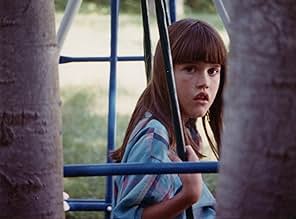अपनी भाषा में प्लॉट जोड़ेंAfter a man suffering from schizophrenia is released from a mental institution, he attempts to get his daughter back from her adoptive family.After a man suffering from schizophrenia is released from a mental institution, he attempts to get his daughter back from her adoptive family.After a man suffering from schizophrenia is released from a mental institution, he attempts to get his daughter back from her adoptive family.
- पुरस्कार
- 5 जीत और कुल 6 नामांकन
फ़ीचर्ड समीक्षाएं
I do not believe this is a very well-known film. I say this because despite it being released by the prestigious Criterion Collection, it was not a title I was familiar with. And I like to think I know movies. (maybe this is naiveté.) Although this went under the radar, I think it deserves a look by anyone who is interested in mental illness, especially as depicted on film. This is not sappy, or starring Sean Penn, or anything we might expect from Hollywood. this is a serious attempt to show the problems the mentally ill face... and it does not leave room for too much happiness.
This is a very edgy little film. I didn't know what it was about when I watched it - I don't know I would have watched it if someone had described it to me. The story unfolds with very little dialogue and doesn't exactly have a plot to speak of. Instead the film puts us in the head of Winter and also comments on society's view of these people.
The audio track is the most disturbing part - full of electrical crackles over strong dialogue (from his life? From movies? We don't know). Most likely these are his `voices'. We also see things through his jumpy eyes are have visions like he does. The most disturbing part is where he removes his own nail to get the transmitter `they' put there. The relentless pursuit of the detective represents our mistrust of these people and the ending makes a clear judgement on his (our) actions. The final shot is a fine summing up of a child's innocence.
Greene (best known for Usual Suspects or Zed in Pulp Fiction) is really good in a role that a big star would have hammed up. He looks totally believable in the lead. Robert Albert is good as the sheriff and mixes his character's morality really well. The film is not a fun time to be had by all! It's plot is weak and the lack of dialogue, weird happenings and lack of explanation may frustrate some. However it is only 80 minutes long so it never drags, it captivates by being so very different and it is very thought provoking.
Overall it's worth a watch - it is edgy and interesting, not the most fun you'll ever have, but then it isn't meant to be.
anyway, if you wanna "feel" - not just see - what mental illness is all about, check this out.
The use of sound in this film practically makes it worth watching in its own right, pun intended. In the critic's video essay that accompanies the Criterion release of this film, which is pitched to grad level film students (and that's not a complaint), Michael Atkinson remarks that the director uses "objective" sound, not "subjective" sound. It's true that the sounds that fill the film's soundtrack are given us from the external world, often through the protagonist's car radio and sometimes simply through the ether. But I'd disagree with Atkinson. I don't think this is just use of objective sound to a parallel the film's fragmented and "subject-less" subject and narrative. Yes, it's a different use of sound, but it's a complication of subjective sound, not a departure from it. After all we hear the soundtrack, and therefore we can't but believe that the subject hears them.
The use of sound here is interesting, I think, because the protagonist is not hearing them but producing them. We're given the sounds as he hears them, but they echo and resound within his schizophrenic mind, as they are the schizophrenic's world. Voices unattributed, perhaps real, perhaps recollected, but certainly not sounds that anchor the schizophrenic to reality. Rather, sounds that divorce him from the world, catching him as abruptly as an unexpected blow to the head. Short, sharp, shocks that knock about and bring into consciousness commands, put-downs, and other forms of verbal punishment that trouble us for their detachment. We don't know who's saying them. Which means we don't know why they are being said, which means (as Atkinson notes), we don't know what to think of them.
Where Atkinson hangs these sounds on a reel of film though, my sense is that they should be hung on memory, which is not a reel of film, is certainly subjective, if not multiply subjective, and is not objective in the slightest for the simple reason that memories can't be. Our schizophrenic protagonist's relation to sound is that he's caught in a compulsive listening, but cannot hear. The coup in Kerrigan's sonic genius, I think, is that in memory is the protagonist's pain, and it's a pain he suffers, often, without making the slightest of sound. But for the one that we hear.
क्या आपको पता है
- ट्रिवियाPeter Greene's first line comes eighteen minutes into the movie.
- गूफ़The steering column shifter knob in Peter's car is missing. Then it reappears.
- भाव
Peter Winter: I was in a, in a hospital bed, and I had been operated on. And they had put a, a small receiver in the back of my head and a transmitter in my finger. You know what they are?
Nicole Winter: A radio?
Peter Winter: Yeah, a radio. Anyway, to get at the transmitter, I had to take my fingernail off.
टॉप पसंद
- How long is Clean, Shaven?Alexa द्वारा संचालित
विवरण
बॉक्स ऑफ़िस
- बजट
- $68,000(अनुमानित)
- US और कनाडा में सकल
- $26,351
- दुनिया भर में सकल
- $26,351




























